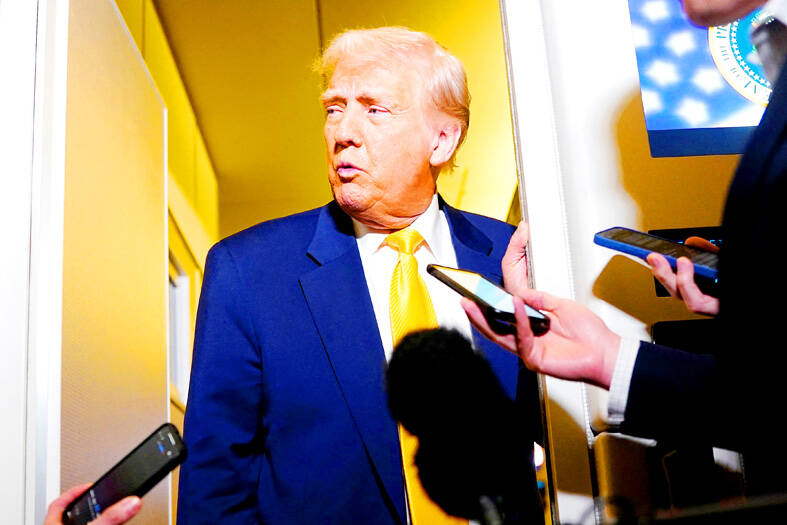US President Donald Trump’s administration exempted smartphones, computers and other electronics from its “reciprocal” tariffs, representing a major reprieve for global technology manufacturers including Apple Inc and Nvidia Corp, even if it proves a temporary one.
The exclusions, published late on Friday by the US Customs and Border Protection Agency, narrow the scope of the levies by excluding the products from Trump’s 125 percent China tariff and his baseline 10 percent global tariff on nearly all other countries.
The exclusions apply to smartphones, laptop computers, hard drives, computer processors and memory chips as well as flat-screen displays. Those popular consumer electronics items generally are not made in the US.

Photo: REUTERS
The move is the first significant easing of any kind in the US trade dispute with China. It was backdated to April 5.
Trump on Saturday declined to elaborate on the exemptions, but hinted at further developments today.
“I’ll give you that answer on Monday. We’ll be very specific on Monday,” he told reporters on Air Force One. “We’re taking in a lot of money; as a country we’re taking in a lot of money.”
The White House also released a corresponding memo indicating that the exemptions also extend to changes in small-parcel shipping duties.
Trump had moved to end the so-called “de minimis” exemption, beginning with China, which generally means parcels worth US$800 or below do not face duties.
Although listed among the exempted goods, semiconductors could still become a target of industry-specific tariffs Trump has suggested placing on imports from all countries.
“President Trump has made it clear America cannot rely on China to manufacturing critical technologies such as semiconductors, chips, smartphones and laptops,” White House press secretary Karoline Leavitt said in a statement.
“That’s why the president has secured trillions of dollars in US investments from the largest tech companies in the world,” she said, adding that the companies are “hustling to onshore” their manufacturing to the US.

Taiwanese Olympic badminton men’s doubles gold medalist Wang Chi-lin (王齊麟) and his new partner, Chiu Hsiang-chieh (邱相榤), clinched the men’s doubles title at the Yonex Taipei Open yesterday, becoming the second Taiwanese team to win a title in the tournament. Ranked 19th in the world, the Taiwanese duo defeated Kang Min-hyuk and Ki Dong-ju of South Korea 21-18, 21-15 in a pulsating 43-minute final to clinch their first doubles title after teaming up last year. Wang, the men’s doubles gold medalist at the 2020 and 2024 Olympics, partnered with Chiu in August last year after the retirement of his teammate Lee Yang

FALSE DOCUMENTS? Actor William Liao said he was ‘voluntarily cooperating’ with police after a suspect was accused of helping to produce false medical certificates Police yesterday questioned at least six entertainers amid allegations of evasion of compulsory military service, with Lee Chuan (李銓), a member of boy band Choc7 (超克7), and actor Daniel Chen (陳大天) among those summoned. The New Taipei City District Prosecutors’ Office in January launched an investigation into a group that was allegedly helping men dodge compulsory military service using falsified medical documents. Actor Darren Wang (王大陸) has been accused of being one of the group’s clients. As the investigation expanded, investigators at New Taipei City’s Yonghe Precinct said that other entertainers commissioned the group to obtain false documents. The main suspect, a man surnamed

The government is considering polices to increase rental subsidies for people living in social housing who get married and have children, Premier Cho Jung-tai (卓榮泰) said yesterday. During an interview with the Plain Law Movement (法律白話文) podcast, Cho said that housing prices cannot be brought down overnight without affecting banks and mortgages. Therefore, the government is focusing on providing more aid for young people by taking 3 to 5 percent of urban renewal projects and zone expropriations and using that land for social housing, he said. Single people living in social housing who get married and become parents could obtain 50 percent more

DEMOGRAPHICS: Robotics is the most promising answer to looming labor woes, the long-term care system and national contingency response, an official said Taiwan is to launch a five-year plan to boost the robotics industry in a bid to address labor shortages stemming from a declining and aging population, the Executive Yuan said yesterday. The government approved the initiative, dubbed the Smart Robotics Industry Promotion Plan, via executive order, senior officials told a post-Cabinet meeting news conference in Taipei. Taiwan’s population decline would strain the economy and the nation’s ability to care for vulnerable and elderly people, said Peter Hong (洪樂文), who heads the National Science and Technology Council’s (NSTC) Department of Engineering and Technologies. Projections show that the proportion of Taiwanese 65 or older would